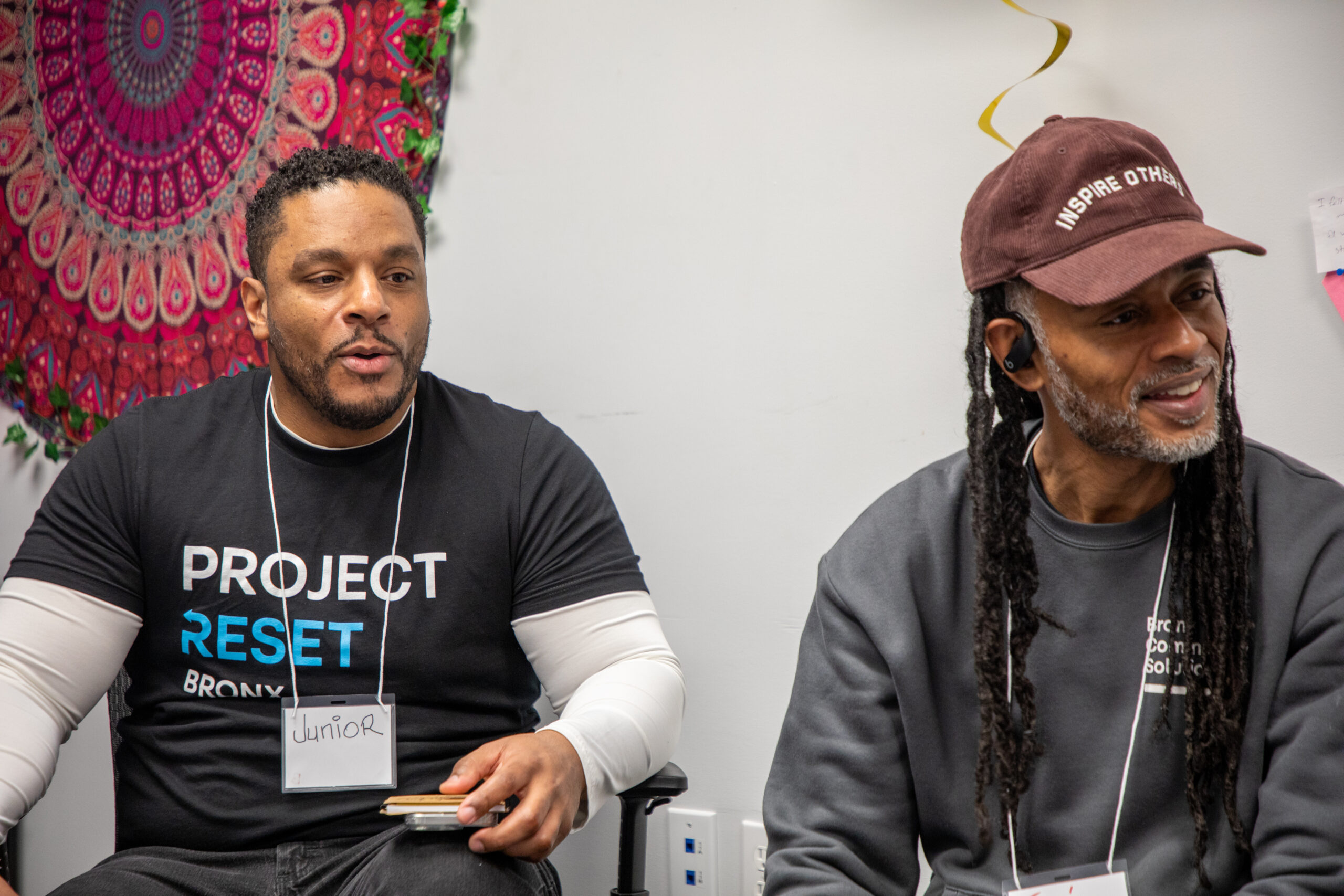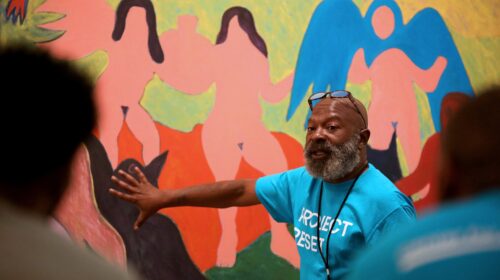Reforms like Project Reset show how we can respond to low-level offenses in ways that strengthen community and put people on track for a brighter future.
For the millions of people in the justice system arrested for low-level offenses each year, a split-second mistake can trigger lasting consequences—court, a criminal record, gaps in education, even job loss.
A growing body of evidence shows that those consequences don’t actually reduce crime. But they do destabilize lives, burden families with fines and fees they can’t afford to pay, and erode trust in the justice system.
Fortunately, there’s another path—one represented by Project Reset, a program we operate in partnership with the Mayor’s Office of Criminal Justice, District Attorney’s Offices across New York City, and public defense organizations. Project Reset gives people charged with minor offenses a chance to reflect, take accountability, and strengthen their connection with the community without ever stepping foot in court.
A better path for responding to low-level crimes
Project Reset is rooted in brief, meaningful responses designed to be restorative both for the individual and the community as a whole—from reflective conversations to arts workshops in partnership with the New Museum and Brooklyn Museum, and more.
Those who graduate from Project Reset walk away without a criminal record, avoiding a long list of barriers that often make it harder for people to get back on track. They’re also able to find connections to longer-term services for everything from mental health to housing, employment, and education. The vast majority of participants are able to complete the program with just one session after their intake.
“I was very burnt out from my job and was in a terrible mental state when I made a mistake that was very much out of keeping with my values,” said Elle, a former participant in Project Reset. “The program helped me understand that my actions were self-destructive in the setting of constant stress and anxiety—and not necessarily because I was devoid of morals.”
First launched over a decade ago as a pilot program for teenagers in just two New York City neighborhoods, Project Reset now serves people of all ages across the five boroughs. For those who aren’t able to access the program before appearing in court, a recent expansion in Manhattan offers Project Reset programming on the same day a participant appears for their arraignment. Project Reset offers both in-person and virtual sessions, giving people an opportunity to complete the program with little disruption to their daily lives.
For Elle, the fact that graduating from Project Reset meant starting fresh without a criminal record was an immense relief. “That would have been very detrimental to my career, and I’m forever indebted to the people and this initiative for giving me another chance.”
While the typical court process aims to hold people accountable, it can often do the opposite—scaring people into shutting down, instead of taking responsibility for their actions and seeking the support they might need to get back on track. In a safe environment, without the looming stresses of court and a criminal record, participants in Project Reset are able to speak candidly about what led up to their arrest and how they can find a way forward.
As Elle puts it, “It offers a safe space for individuals to feel supported and heal from their mistakes, and allows them to find forgiveness and closure.”
Bringing the community into justice reform
In the Bronx, our Project Reset team creates that sense of support in a unique way—by inviting members of the community into restorative justice circles as volunteers.
Rooted in centuries-old indigenous traditions, restorative justice brings people who have made a mistake together with those who have been harmed, their neighbors and loved ones, and others in the community for a process of open, non-judgmental dialogue. Instead of focusing on blame and punishment, it opens the door to accountability and healing.
As a long-time volunteer with Project Reset, Iisha Stevens-Hamilton has sat in circles with dozens of her neighbors facing difficult moments in their lives. Her presence as someone else from the community, she says, often helps to make that moment feel less daunting.
“When we have volunteers in the circle, I’ve personally seen participants drop their guard a little bit,” said Stevens-Hamilton. “They feel more comfortable knowing I’m just a regular person from the Bronx, just like them.”
Our Bronx team trains volunteers in principles of restorative justice and empathetic storytelling. A network of community volunteers—made up of residents, violence interrupters, mental health professionals, religious leaders, and others—support participants by sharing their own experiences, modeling what vulnerability looks like, and serving as neutral voices.
“It’s really a listening practice,” Stevens-Hamilton said. “I always try to lean in with compassion and understanding, not judgment—to let people share with ease and comfortability and let them know that we’re all here sharing our stories too.”
Another local volunteer, Junior Gonzalez, shared that the beauty of the program has spilled out into his own life as well. “I’ve truly cherished my involvement in restorative justice circles in both English and Spanish, street beautification projects where we plant flowers and trees, community block parties, school supply giveaways, and many other community events,” he said. “Each of these experiences has profoundly deepened my connection to our community and reinforced the spirit of togetherness that makes it truly special.”

“A brighter, more hopeful future”
Apart from the immediate harms of a criminal record, lost time at school or work, and financial burdens, Project Reset also prevents much of the emotional harm and trauma often caused by the typical legal process.
“We hear participants share how scared they felt during their arrest because no one was able to communicate with them and they didn’t speak English, or they’re afraid that a mistake they made once is now going to haunt them for the rest of their lives,” said Jessica Taveras, a Rapid Engagement Specialist with Project Reset in Midtown Manhattan. “And we have participants who are brought to tears when they find out that their case is eligible for the program.”
In the supportive context of Project Reset, people often feel more comfortable asking for help when they need it—addressing the underlying challenges that may have brought them into the system in the first place. “Whether they need assistance looking for a job or are having a hard time providing meals for their families, we’re able to point them in the direction of food banks and community pantries and other meaningful resources,” said Taveras.
In Brooklyn and Manhattan, participants are also able to complete their time in Project Reset through unique arts-based programming. Arts workshops in partnership with the Brooklyn Museum, New Museum, and Artistic Noise allow people to creatively explore questions of identity and justice while processing the trauma that often stems from—and leads up to—the experience of an arrest.
Given the link between crime and past experiences of trauma, reforms like Reset that transform the experience of navigating the justice system can help strengthen community safety in the long term. They also boost trust in the justice system as a whole, which is damaged by responses that feel disproportionate or harmful for those involved.
“If someone goes through an arrest, that’s trauma in itself,” said Iisha Stevens-Hamilton. “But the anxiety of stepping into a courtroom is taken away once you know you can sit in a circle with Project Reset and talk about your experience in a vulnerable way.”
As volunteer Junior Gonzalez put it, “It creates a pathway toward a brighter, more hopeful future for everyone involved.”
